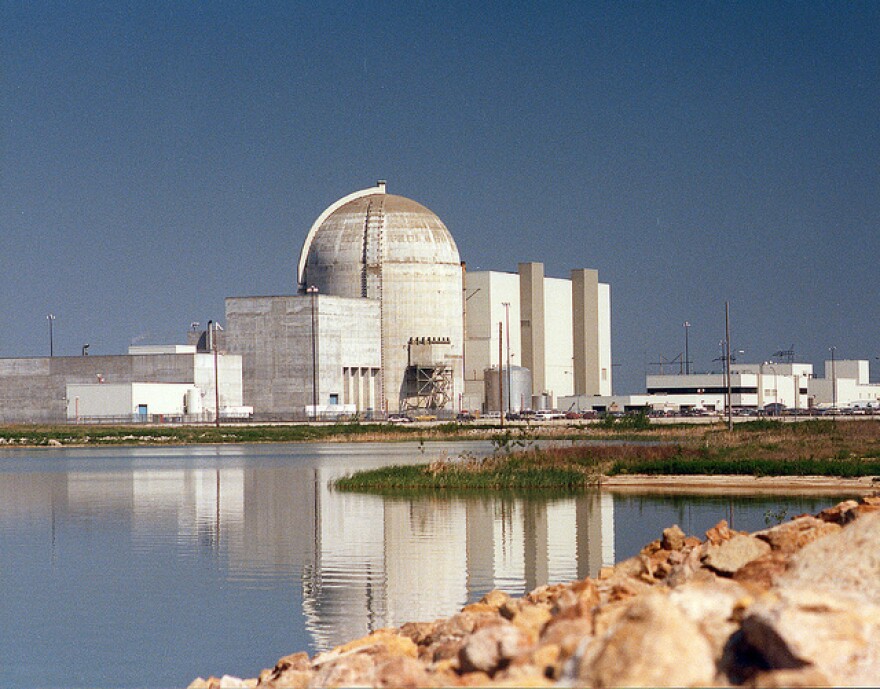Since 2009, Westar Energy has increased its rates 22 times. Over that same period, energy bills for residential users have increased 40 to 50 percent. KMUW’s Sean Sandefur takes a closer look at the company’s most recent rate increase proposal and how it could change the way some customers look at their energy consumption…
Earlier this week, Westar Energy filed a rate increase request that would bring in an additional $152 million a year. According to the company, the added revenue is needed to keep up with government regulations and to maintain its infrastructure.
Gina Penzig is a spokesperson for Westar. She says the company has two power plants that have required hundreds of millions of dollars of work.
“Namely the LaCygne Power Plant, in order to make sure that we stay in compliance with Clean Air Act regulations," Penzig says. "Another piece of the rate increase goes to continued improvements in the Wolf Creek Nuclear Plant.”
The Wolf Creek Nuclear Generating Station in Burlington was shored up with earthquake protection in response to the 2011 Fukushima meltdown in Japan. Penzig says the upgrades were federally mandated and unavoidable. Add that to Clean Air Act regulations, and she says the company’s infrastructure costs have skyrocketed. But, she says utility expenditures come in cycles, and that rising rates won’t always be the norm.
“We do expect it to be much less intense than the past decade, when we've been investing in the environmental controls and the mandates on our plants,” Penzig says.

From 2009 to 2014, Westar Energy added $538 million to its revenue stream through rate increases. That’s according to the Kansas Citizens' Utility Ratepayer Board, a state agency that represents both residential and small, commercial ratepayers. David Springe is consumer counsel for the organization. He says residential users have been hit the hardest over the years, and that this most recent rate increase request is no different.

“They say that it's about a 7.9 percent overall increase in revenues," Springe says. "For residential customers, though, it's more like a 12 percent increase.”
Springe says that translates to an added $15 to $20 on a residential bill this summer.
He says long-term, rate hikes might slow down, but in the near future, they’re far from over.
“Westar says that they have about $3.4 billion worth of capital expenditures planned for the next five years," he says. "So, I think customers can clearly expect a continuing series of rate increases in the future.”
Gina Penzig of Westar says the company has no choice, and that the funding model for providing electricity is backwards. She says their expenditures have little to do with the amount of electricity they actually provide.
“As a utility, we are a very capital-intensive business," Penzig says. "Meaning that there's a lot of things--power plants, power lines, a lot of infrastructure--that go into place in order to provide electricity. And so, if you really look at how we incur our cost of doing business, most of it is a fixed cost and a very small portion of it actually fluctuates based on the amount of energy that's used."
The model of usage-based billing is beginning to shift. Westar is looking at ways to charge customers the same way they incur costs: less emphasis on per-kilowatt use charges. Penzig points to changes in its current rate increase request. The company would double its current flat fee over the next four years and provide different billing options to its customers. One of those options would be a $50 monthly fee with lower per-kilowatt use charges.
“So if you are a household where high summer bills are a concern and you'd like a way to level out your bill, this might be a good opportunity for you to do that," Penzig says.
What’s lost in a billing model such as this are the households or businesses who might want to use as little electricity as possible, whether for environmental reasons or just to save money.
David Springe says a shift towards flat fees could take away some of the benefits of greener technology, such as better insulation and energy efficient appliances and electronics.
“If you move more of the bill over to [flat fees], putting in insulation and changing your thermostat won’t change ultimately what you pay," Springe says. "It does, I think, arguably take away some of the pricing incentives that’s out there for doing energy efficiency.”
Penzig admits that additional flat fees could change the way some customers approach energy consumption, but the incentive for using less electricity will remain.
“It could, in some cases, have some effect on behavior," she says. "A lot of times energy efficiency is driven by more than just a cost concern. Sometimes it's more of an environmental concern or other interests.”
A portion of Westar’s requested rate increase is essentially required. Upgrades to the Lacygne Power Plant and the Wolf Creek Nuclear Generating Station have already been approved and must be paid for. But David Springe says it’s not clear how much of the requested funds Westar will actually receive.
“We'll get in and we'll hire outside accountants and engineering experts to dig through Westar's books and take a very close look at what it is they're asking (for)," he says. "We'll probably have a different opinion about what they need. It will be something less than $152 million.”
Something that Springe will be arguing is the 10 percent shareholder profit that Westar wants as part of the rate increase. He thinks it’s too high. He's successfully lowered shareholder profit rates in previous requests.
Both the Kansas Citizens' Utility Ratepayer Board and Westar will present their cases before the Kansas Corporation Commission in August. The state regulatory committee, which oversees telecommunications and utilities, will make have to hand down its decision by mid-October.
To contact KMUW News or to send in a news tip, reach us at news@kmuw.org.
Follow Sean Sandefur on Twitter, @SeanSandefur

